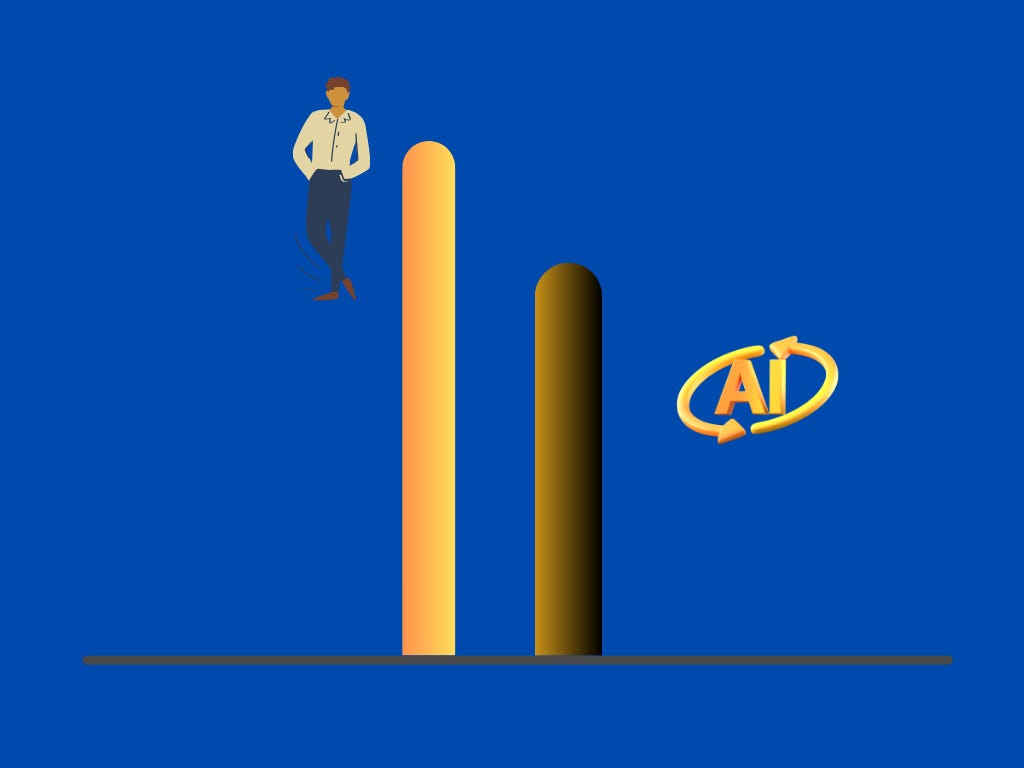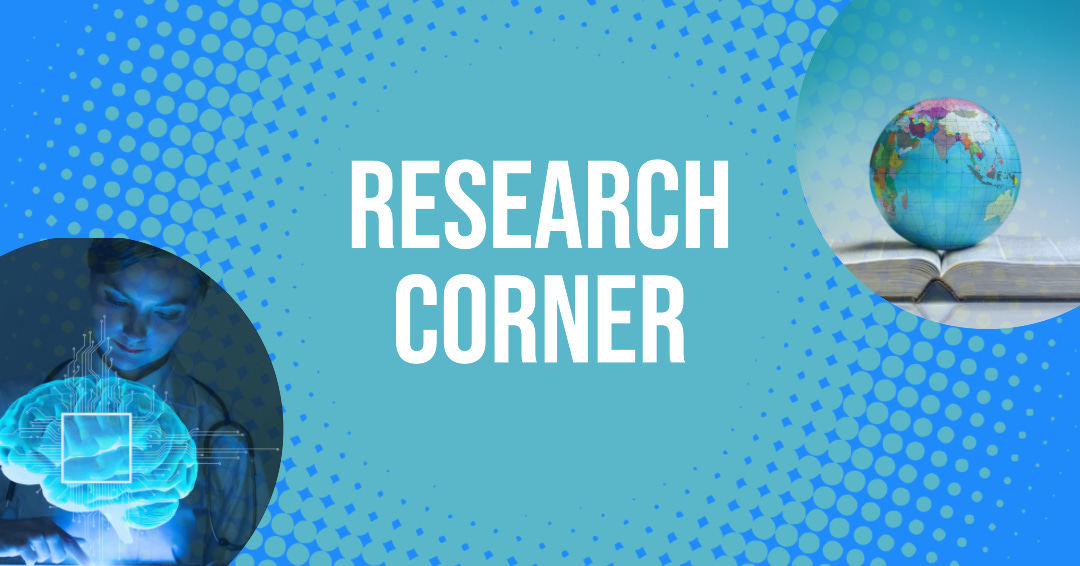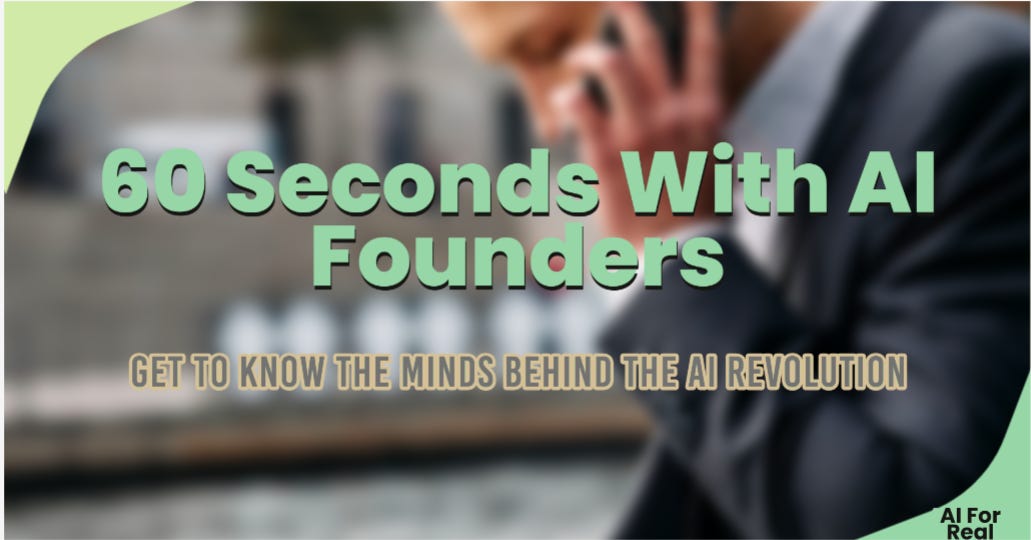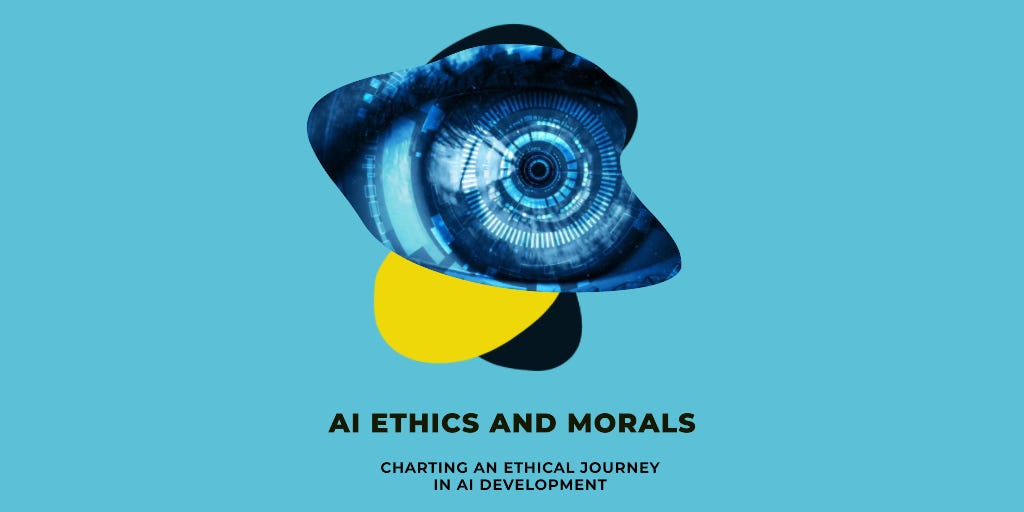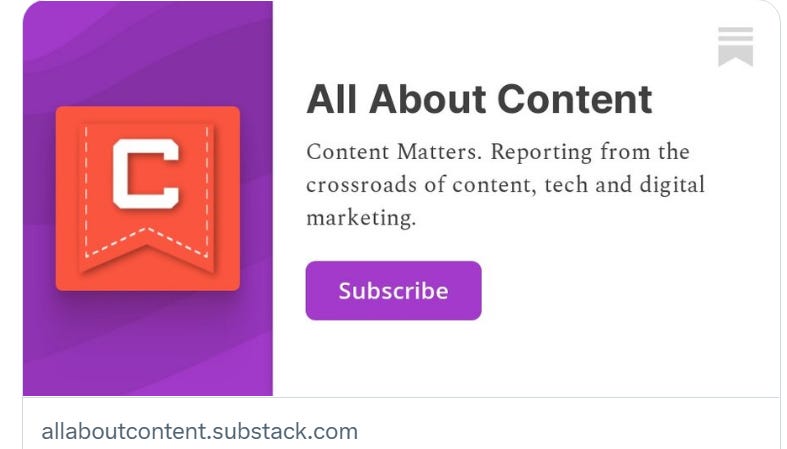Workers and AI: Just Keep Swimming or Change Course?
Elon and a few others say traditional jobs will soon be gone. Accurate forecast or sheer exaggeration?
Last week, maverick entrepreneur-scientist-businessman Elon Musk spoke of the disruptive impact of artificial intelligence (AI) on conventional jobs and suggested that the ongoing evolution of AI might prompt a reevaluation of how people derive meaning in life when work is no longer a fundamental necessity.
Imagine most people on earth not having to go to work. Is Elon right in predicting this? No one can know for sure. But the rough consensus is that there will be AI-linked jobs. New job profiles are already cropping up. More will be born soon.
Employees need to start preparing for this. Neither indifference nor procrastination will help.
Now, before getting on with this newsletter, let’s first take a look at the AI Job Indicator.
Artificial intelligence beat back humans last week where jobs were concerned; the highest ever climb in recent weeks.
In Today’s Newsletter:
Study Unveils the Need for Reskilling 16.2 Million Workers in India Amidst AI and Automation Boom
First of the Layoffs Due to AI Has Started
AI Will Do Away With All Traditional Jobs: Elon Musk
Education is Key To AI: British PM
Impact of AI on Jobs is Quite Complex
A Content Creator’s Battle Against Erring AI Detection Tools
Techie Uses AI Bot to Auto-apply to 5000 jobs
Doctors Are Concerned Over Introduction of AI
New Research Shows LLMs Do Understand Emotional Stimuli
Businesses Get Good Returns On AI, Shows Study
Ex-Google CEO’s Bid to Create AI as Scientists
US News Outfit to Launch Unit to Combat Misinformation
Company Says Chip Carrying Sea Barge is Sovereign State But is it a Hoax?
Plus “Top Picks”, “Events” and much more.
Artificial intelligence is Creating a Different Class of “Haves” and “Have-Nots”
Unbeknownst to many, the rise of artificial intelligence is creating a new class of "haves" and "have-nots" based on AI skills and capabilities.
AI is rapidly making inroads into the workplace, leaving employees, especially white-collar workers, wondering how to tackle the new technology onslaught. From initial indifference, workers are now aware that AI is not going away and is not just one of those tech fads.
The reaction to this is either a hurry to come up to speed with AI, or continuing to feign ignorance, hoping the tech shall fade away some day.
For those who want to adapt and upskill or even reskill, AI presents a world of possibilities. AI-powered tools can augment human capabilities, making workers more efficient and productive. AI can also open up new career paths in fields like data science, machine learning, and AI development. A hurdle for this lot, however, can be the cost and time involved in the re-learning.
However, those unable or unwilling to adapt to the AI-driven workforce risk being left behind. Automation and AI are already replacing jobs in manufacturing, transportation, digital marketing, content, healthcare, and customer service, and this trend is likely to continue as AI becomes more sophisticated. Without the necessary skills to compete in the AI-powered economy, many workers may face long-term unemployment or underemployment.
Those with the financial resources and support to acquire AI skills are likelier to thrive in the AI economy. However, many workers, particularly those from marginalized communities, lack access to the same opportunities. Thus, it must be ensured that access to AI education and training is democratic.
To ensure that AI benefits society, all of us - governments, private enterprises, educationists, and non-profits- must take proactive steps to bridge the AI divide. As UK Prime Minister Rishi Sunak said (scroll down for report) at the AI Safety Summit, education reforms will enhance skills.
The strategy must include investing in education and training programs that make AI skills accessible to all, regardless of their background or socioeconomic status. We also need to develop policies that support workers transitioning to new jobs in the AI economy.
AI has the potential to revolutionize the global economy. The new AI divide needs, no, MUST be addressed quickly where the benefits of AI are explained and understood by all, and not just by those who can afford to upskill.
Readers: What are your views on this? Please comment.
AI and Automation Surge to Trigger Reskilling of 16.2 Million Workers in India, Reveals Study
According to the findings from American software company ServiceNow, the ascent of emerging technologies, including AI, may also give rise to approximately 4.7 million new technology jobs in India. Furthermore, the demand for professionals with ServiceNow platform technical skills in job postings across India has surged by 39 percent over the past year, with Bengaluru emerging as the global epicenter of talent demand in this field.
What It Means For Us?
Across the globe, upskilling and reskilling are now required because of AI taking up the repetitive jobs of humans. Those who don’t wake up to this stand to become unemployed every fast.
Source: businessstandard.com
The Layoffs Have Started
San Francisco Bay Area-based AI startup “Informatica” has transformed the fears of AI displacing jobs into reality. In a bold move, the company has chosen to downsize its workforce by more than 500 employees as a “strategic step”, despite a highly successful third quarter. This period at Informatica met expectations and exceeded them with remarkable precision.
Led by Indian American CEO Amit Wali, the company's financial performance soared to heights surpassing even the most optimistic forecasts. Sales surged, and earnings exceeded expectations.
The kicker: Despite these outstanding results, the company unveiled a restructuring plan that involves parting ways with 545 of its employees, equating to a 10% reduction in its workforce. This significant downsizing includes the departure of 90 individuals from their Redwood City headquarters.
Source: hindustantimes.com
Exciting Opportunities for Newsletter Sponsorship!
Discover available ad and sponsorship slots for this newsletter by clicking on this link. Explore the various packages to find the perfect fit for your brand.
If you would like further information, please don't hesitate to contact me. Let's collaborate and customize the best deal tailored to your specific needs. Click on the tab above. Or, for individual requirements, write to marketing (at) newagecontentservices.com
All Traditional Work Shall Soon Be Gone: Elon Musk….
During a 50-minute conversation with UK Prime Minister Rishi Sunak at the AI Safety Summit in London, Tesla, SpaceX, and X (formerly Twitter) chief Elon Musk discussed the transformative potential of AI. Musk shared his prediction that AI could ultimately make traditional paid employment obsolete. The interview covered various facets of AI, including the prospect of humanoid robots capable of pursuing individuals anywhere, though it also raised concerns about the risks posed by AI on employment and the necessity for regulatory measures.
Elon said that as AI advances, it could fundamentally alter the job landscape, prompting questions about how people derive meaning from their lives when work is no longer a fundamental requirement.
Elon said the world was witnessing “the most disruptive force in history”. adding there will come the point where no job is necessary because AI would be capable of handling everything. It's a double-edged sword. One of the challenges in the future will be how to find meaning in life, added Elon.
Source: livemint.com
….But Rishi Sunak Assures Public That Education Reforms Will Bolster Job Prospects
Following the UK's inaugural AI Safety Summit, Prime Minister Rishi Sunak emphasized that people need not fret over the impact of AI on jobs. He stated that forthcoming education reforms would enhance skills and underscored the long-term economic benefits of technology.
Sunak suggested that new AI tools should be regarded as "co-pilots" that aid individuals in their work, rather than replacing them. He underscored the government's responsibility to improve training and acknowledged the concerns surrounding the potential influence of AI on employment. However, he remained optimistic, asserting that AI would ultimately boost productivity.
In the view of the British PM, AI was more of a co-pilot rather than a force set to replace jobs. AI is a valuable tool that can enhance the performance of nearly anyone in their roles, making them more efficient and effective, he explained.
Source: bbc.com
The Impact of AI on Jobs: A Complex Landscape of Challenges and Opportunities
The AI revolution brings the promise of creating new job opportunities. The demand for skilled professionals capable of designing, managing, and improving AI systems is rising. Roles in data science, machine learning, robotics, and AI research are gaining popularity.
Thus, the question arises: Will AI serve as a source of new employment or herald the decline of traditional roles?
A recent study seeks to address this critical question.
Weiguang Wang, a leading author from the University of Rochester, conducted a field study among knowledge workers, unearthing intriguing insights. Wang expressed surprise at the findings, emphasizing the unique interactions and roles that different aspects of work experience play in human-AI collaboration.
The research also explored the experience level workers need to derive the most significant benefit from AI. Guodong (Gordon) Gao, a co-author from Johns Hopkins Carey Business School, noted that while one might assume less experienced workers would benefit most from AI assistance, the opposite holds true: AI proves more advantageous for workers with greater task-based experience. In contrast, senior workers, despite their extensive experience, tend to derive fewer benefits from AI than their junior counterparts.
Productivity gains are achievable through effective AI utilization. Experienced workers are better equipped to harness AI for increased productivity. However, senior employees, who carry greater responsibility and a deeper commitment to their organizations, often hesitate to embrace AI due to concerns about potential risks. Consequently, they may underutilize AI.
The researchers stressed the importance of considering the diverse types and levels of worker experience when implementing AI in the workplace. New employees with limited task experience may face challenges in utilizing AI, while senior employees, despite their organizational expertise, might be apprehensive about AI's potential threats. Successful collaboration between humans and AI necessitates addressing these varied perspectives and finding a balanced approach.
What It Means For Us?
The concerns surrounding the influence of AI on employment have sparked considerable debate. Will millions of jobs go away? Will many of them be replaced with other jobs or AI? The effects of AI on the labor market vary across industries and regions, raising both hopes and apprehensions.
AI-powered automation has the capacity to assume routine, repetitive, and manual tasks, potentially placing jobs in sectors like manufacturing, data entry, and customer service at risk. Workers in these fields could face displacement. But what is now emerging is that new job profiles, too, may crop up because of AI.
Source: interestingengineering.com
Unjust AI Accusations: The Story of Michael's Battle Against AI Detectors
AI detectors that claim high accuracy in identifying AI-generated content often rely on small datasets, casting doubt on their reliability. Even skilled writers can find themselves wrongly accused of using AI-generated text, leading to significant challenges in refuting such allegations.
In some cases, the consequences can be quite severe, resulting in the loss of clients, like in the case of Michael. According to the AI detector used by Michael's employer, his texts were indicated to be between 65-95% likely to be AI-generated, depending on the specific piece. Any experienced writer can attest that such an accusation is not only hurtful but also deeply distressing. So, how can one prove the AI detector wrong? This may involve presenting the research behind their work, highlighting their unique writing style, and explaining their creative process. Going through this ordeal can be quite painful, but Michael persevered.
To clear his name, Michael even contacted the company providing the AI testing service, but to no avail. They simply advised him to create an account, purchase credits, and retest his articles independently. Ultimately, nothing changed the overarching message from the AI detector, which continuously suggested, "You are cheating."
Regrettably, Michael's story did not have a happy ending. His client remained steadfast in their decision, fearing the potential repercussions of having AI-generated content downranked by Google.
Source: authory.com
Techie Uses AI to Apply For 5000 Jobs
In July this year, software engineer Julian Joseph faced the unfortunate consequences of tech industry job cuts, marking his second layoff in as many years. Dreading the prospect of repetitive job applications, he sought a solution to streamline the process.
Joseph specializes in user interface automation and believed that there must be a more efficient way to apply for jobs. His search led him to “LazyApply”, a company offering an AI-powered service called Job GPT. This service promised to automate job applications by submitting them to thousands of positions with a single click. All he had to provide was basic information about his skills, experience, and job preferences.
After investing $250 in a lifetime unlimited plan and installing LazyApply's Chrome extension, Joseph witnessed the AI bot swiftly submitting applications on platforms like LinkedIn and Indeed, targeting jobs matching his criteria. Eager to maximize efficiency, he also installed the app on his boyfriend's laptop, resulting in a combined effort that applied to nearly 1,000 jobs overnight.
While the tool wasn't flawless and sometimes guessed answers to application questions, it proved effective through sheer volume. Joseph reported that LazyApply helped him apply to approximately 5,000 jobs, resulting in around 20 interview invitations, equivalent to a success rate of about 0.5%. Although this rate was lower compared to the 20 interviews he secured manually applying to 200-300 jobs, the time saved made the investment worthwhile.
Source: wired.com
Majority of Physicians Express Concerns About AI's Role in Diagnosis and Treatment: Survey
A recent survey has revealed that nearly two-thirds of physicians had apprehensions about the impact of AI on diagnosis and treatment decisions. According to the Medscape survey, 65% of the surveyed physicians expressed varying degrees of concern, ranging from "very" to "somewhat," regarding AI's role in guiding diagnosis and treatment decisions. Meanwhile, 36% respondents indicated that they held minimal to no concerns about AI's involvement in these aspects of healthcare.
What It Means For Us?
Trust is something that is earned. Trusting AI, a tech still in its nascent stage, for interpreting medical results is difficult, especially for a medical community that’s never come face to face with a transformative tech like this. But let there be no doubt that eventually, AI will play a huge role in medical analysis.
Source: thehill.com
Europe Event on AI's Transformative Influence on Employment
Artificial intelligence is poised to start a profound transformation across various industries, potentially impacting every facet of our professional lives. To navigate this impending shift, employers, employees, and policymakers must be adequately prepared.
One of the central themes of the upcoming “2023 European Employment & Social Rights Forum” (EESRF), titled 'The Impact of AI on the World of Work,” is to ensure that workers can harness the full potential of AI while establishing clear regulations that uphold the quality of jobs.
This forum, hosted by the European Commission in Brussels and virtually on November 16 and 17, underscores the importance of addressing AI's influence on the workforce.
LLMs Do Understand Emotional Intelligence: New Study
This research takes the first step to understanding whether Large Language Models (LLMs) comprehend emotional stimuli.
According to this study, emotional intelligence significantly impacts daily behaviors and interactions. While LLMs are increasingly seen as a step towards achieving artificial general intelligence (AGI), their ability to grasp emotional stimuli has been uncertain. Recognizing and responding to emotional cues is a distinct advantage for humans in problem-solving.
The study involved automatic experiments on 45 tasks using various LLMs, including Flan-T5-Large, Vicuna, Llama 2, BLOOM, ChatGPT, and GPT-4. These tasks encompassed deterministic and generative applications, providing a comprehensive evaluation scenario.
The findings from these automatic experiments revealed that LLMs do have an understanding of emotional intelligence.
Notably, their performance improved when given emotional prompts, called "EmotionPrompts." For instance, there was an 8.00% relative performance improvement in Instruction Induction and a significant 115% boost in BIG-Bench.
In addition to tasks that could be automatically assessed using existing metrics, the study also included a human evaluation with 106 participants to assess generative tasks using both standard and emotional prompts. The results from this human study demonstrated that the use of EmotionPrompts significantly enhanced the performance of LLMs, resulting in an average improvement of 10.9% across various performance, truthfulness, and responsibility metrics.
The research paper delves into a detailed discussion of why EmotionPrompts are effective for LLMs and explores the factors that influence their performance. It suggests that EmotionPrompts open up a novel pathway for the exploration of interdisciplinary knowledge and interaction between humans and LLMs.
Using "EmotionPrompts" resulted in higher-quality outputs, with an improvement of 8% during instruction induction and 115% on higher-stakes tasks.
What It Means For Us?
Till recently, we were told how AI only mimicked the working of the human brain and not the brain itself. We were also told machines do not understand emotions. If LLMs start to understand emotion-based prompts, it will be a significant step towards AGI.
Source: https://arxiv.org/abs/2307.11760
- Your story matters. Your innovation matters -
If you are an AI entrepreneur*, startup founder, etc, and are eager to say your piece in under a minute, drop in an email with the subject line: “Yes, to 60 secs” to marketing (at) newagecontentservices.com We promise to revert ASAP.
AI is Worth The Investment For Businesses
A survey conducted by research firm IDC (and commissioned by Microsoft), which involved 2,100 global business leaders and decision makers, revealed that the survey participants reported an impressive average return of 3.5 times on their AI investments.
In simpler terms, for every $1 invested, they are realizing a return of $3.5 in value.
The survey indicates a heightened level of enthusiasm among businesses regarding their investments in AI.
Source: venturebeat.com
Eric Schmidt Backs Nonprofit That Wants to Make AI Into Scientists
Eric Schmidt is providing financial support for a nonprofit organization dedicated to transforming the scientific research process.
Known as “Future House”, it has ambitious plans to develop AI tools capable of not only analyzing and summarizing research papers but also responding to scientific queries using advanced language models—similar to the technology that underpins popular AI chatbots. However, Future House's vision extends even further.
The "AI scientist," as Future House describes it, will eventually possess the capability to analyze vast volumes of scientific papers efficiently and autonomously generate hypotheses at a pace and magnitude surpassing that of human researchers.
What It Means For Us?
If the Future House team is eventually successful in building AI scientists that can peruse millions of research papers and come up with hypotheses on their own, without any human intervention, AI would then truly be the last invention by mankind.
Source: seattletimes.com
US News Outfit to Launch Unit to Combat Misinformation and Deepfakes
CBS' news-and-stations division is set to establish a new investigative unit aimed at addressing the issues of misinformation and deepfake videos. The unit, named "CBS News Confirmed," will be co-led by Claudia Milne, the senior vice president for CBS News and Stations and head of standards and practices, in collaboration with Ross Dagan, the executive vice president and head of news operations and transformation for CBS News and Stations.
In a memo to staff, Wendy McMahon, CEO of CBS' news, stations, and media ventures operations, emphasized the need to confront the challenges posed by the rapid advancements in technology, including the emergence of generative AI, fake videos, and misinformation.
What It Means For Us?
With malicious deepfakes getting rampant and more sophisticated, software alone is not enough to detect such fake things. CBS has taken the right step, and hopefully, other global media outlets will follow suit to stop fake information from getting in front of the general public.
Source: variety.com
Company Says Chip Carrying Sea Barge is Sovereign State But is it a Hoax?
Over last weekend, a company calling itself "Del Complex", positioned as an AI research firm, created a buzz across the world by unveiling the "BlueSea Frontier Compute Cluster" (BSFCC). Essentially, it's a solar-powered barge housing 10,000 Nvidia H100 GPUs designed for AI training. Oddly enough, they've been touting the barge as a "sovereign nation-state" complete with its own security forces. But what really got everyone was Del Complex's claim that it had done all of this to get away from regulatory oversight.
The announcement on X caught a lot of attention, amassing over 2.2 million views. A few news outlets even reported the "development". Later, some of them followed-up and said the whole thing was a hoax, claiming Del Complex was not a legitimate AI company.
Del's website features bizarre AI-generated images with jumbled text and weird facial features.
Hoax or otherwise, it has raised questions pertaining to the regulation of AI. What if there are some players who eventually really establish such autonomous territories exclusively focused on AI advancement, without any international regulation?
Scary?
Source: vice.com
..where every week, I shortlist interesting articles, posts, podcasts, and videos on AI
Trust is a Two Way Street, Especially at Work Place
I came across this article by fellow Substacker Sean Byrnes that underscores the challenge of maintaining transparency in intricate business scenarios. The author, advocating for team education to provide essential context, emphasizes the commitment to transparency as a performance enhancer and an enhancement to the leader's quality of life.
Although the piece is more slanted toward revenue generation, etc. I thought it also strikes a chord in today’s workplace, which is being increasingly overrun by AI.
Despite the commitment to transparency, the article acknowledges the inherent challenges.
While acknowledging that building trust is not mandatory for team leadership, the article conveys the author's preference for trust-building through transparency and education. The investment in trust is seen as both a performance enhancer and a contributor to the leader's improved quality of life.



